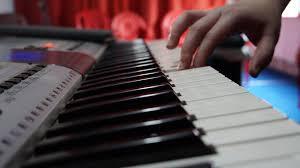Finding the Right Piano Teacher
The journey of learning the piano is as intricate as the instrument itself. While self-learning has its merits, having a good piano teacher can make a world of difference. They not only impart technical skills but also instill a passion for the instrument, ensuring that the student’s musical journey is both educational and enjoyable. But how does one find a good piano teacher? Let’s delve into the considerations and recommendations.

1. Qualifications and Experience: A teacher’s qualifications can be a good starting point. Look for teachers with formal training, degrees, or certifications from recognized institutions. However, remember that a degree doesn’t always equate to teaching prowess. Experience, both in terms of years and diversity (teaching different age groups and skill levels), can often be more telling.
2. Teaching Philosophy: Every teacher has a unique teaching style. Some might be strict and structured, focusing on classical training, while others might be more flexible, allowing students to explore different genres. It’s essential to find a teacher whose philosophy aligns with the student’s goals and learning style.
3. Location and Environment: Consider the logistics. Is the teacher’s location convenient? Is the teaching environment conducive to learning? For younger students, safety should also be a priority.
4. Performance Opportunities: Regular recitals or performance opportunities can boost a student’s confidence. It gives them a platform to showcase their skills and track their progress.
5. Feedback and Communication: A good piano teacher will regularly provide feedback, helping students understand their strengths and areas for improvement. Open communication between the teacher, student, and, if applicable, parents is crucial.
6. Rates and Affordability: While it’s true that you often get what you pay for, expensive doesn’t always mean better. It’s essential to find a balance between quality and affordability.
7. Trial Lessons: Many teachers offer trial lessons. This is an excellent opportunity to gauge the teacher’s style and see if it’s a good fit.
8. Recommendations and Reviews: Word of mouth can be invaluable. Ask around in your community, or look for online reviews. Personal experiences can give you insights that you might not find elsewhere.
9. Continual Learning: The world of music is ever-evolving. A good teacher will continually update their skills and knowledge, ensuring that their teaching methods remain relevant.
10. Passion and Patience: Lastly, and perhaps most importantly, a good teacher will have a genuine passion for music and teaching. They should be patient, understanding that every student learns at their own pace.
11. Regular Practice: With the right teacher, students often find themselves motivated to practice regularly. Consistent practice is the key to mastering any skill, and with a supportive teacher guiding the way, students are more likely to stick to a routine and enjoy their practice sessions.
12. Exploring Different Genres: A versatile piano teacher will introduce students to various musical genres. From classical to jazz, blues to pop, exploring different styles can enrich a student’s musical vocabulary and enhance their appreciation for the instrument’s versatility.
13. The Importance of Theory: While playing the piano is a tactile and auditory experience, understanding the theory behind the music is equally crucial. A good teacher ensures that students grasp fundamental music theories, helping them become well-rounded musicians.
14. Encouraging Creativity: Beyond playing existing pieces, a commendable teacher encourages students to compose and improvise. This fosters creativity, allowing students to express themselves and discover their unique musical voice.
15. Building Resilience: Learning an instrument comes with its challenges. There will be moments of frustration and self-doubt. A good teacher recognizes these moments and uses them as opportunities to teach resilience and perseverance.
16. Celebrating Milestones: Every small achievement, from mastering a challenging piece to successfully performing in a recital, deserves celebration. Recognizing and celebrating these milestones can boost a student’s confidence and motivation.
The Bigger Picture:
The journey of learning the piano is more than just hitting the right notes. It’s about personal growth, building discipline, enhancing cognitive abilities, and most importantly, finding joy in music. With the right teacher by your side, this journey becomes a fulfilling and enriching experience.
In the end, the question isn’t just whether piano lessons are worth it, but whether the journey they set you on enriches your life. And with the right guidance, the answer is a resounding yes. The melodies and harmonies you create become the soundtrack to your life, a testament to the dedication, passion, and love for music that a good teacher instills in you.
In Conclusion To Finding the Right Piano Teacher:
Finding the right piano teacher can be a daunting task, but the effort is well worth it. A good teacher can inspire and motivate, turning the learning process into a delightful journey. Whether you’re a parent looking to introduce your child to the world of music or an adult wanting to fulfill a lifelong dream, the right teacher can make all the difference. Remember, it’s not just about learning to play the piano; it’s about cultivating a lifelong love for music.
Once you’ve found the right teacher, the journey truly begins. The relationship between a student and their piano teacher often extends beyond mere lessons. It becomes a mentorship, a guiding light that illuminates the path of musical discovery.
Finding the Right Piano Teacher by Joshua Samuel
Your comment is awaiting moderation.
buy modafinil pills for sale provigil without prescription generic modafinil order modafinil 200mg pill modafinil price provigil 100mg generic buy provigil generic